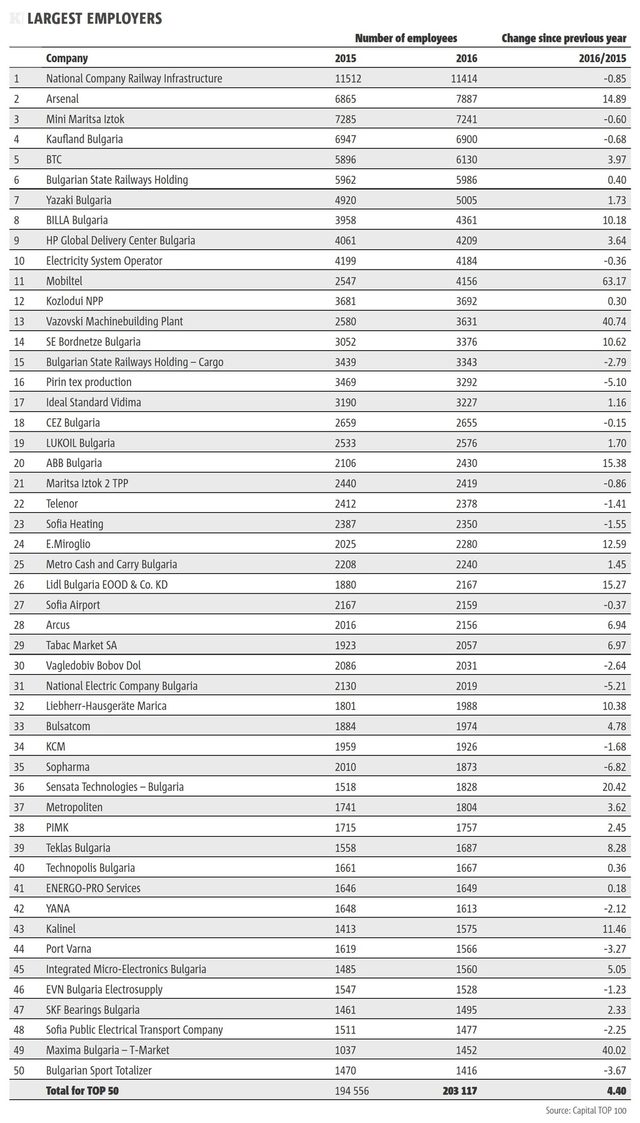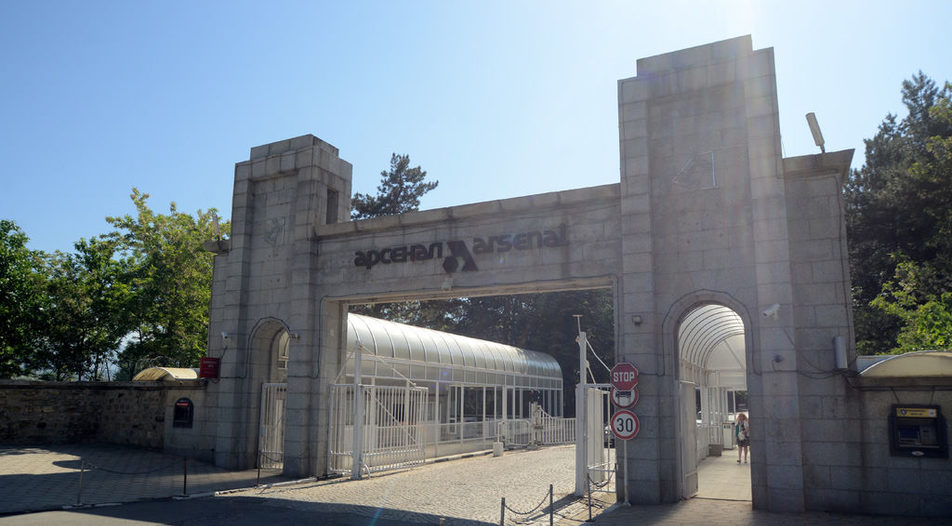А labor shortage and a widening gap in the expectations of potential employers and job seekers can describe in brief Bulgaria's labor market in 2016. The tendency has been strengthening during the current year as well: predictions point to a continuing decline of unemployment, while wages will grow.
Unlike the previous two years, apart from export-oriented companies, those selling on the domestic market also began to create new jobs - a tendency observed among the top 100 employers in 2016 as well. Slightly more than half of these companies hired people last year, creating over 8,500 new jobs net. Therefore, the staff of the 100 companies with the highest number of employees in the top 300 sample exceeded 200,000 for the first time. Overall, however, the growth rate was similar to the one in each of the preceding two years: 4% on an annual basis.
In 2016, the labour shortage affected not only the IT sector and industry but almost all economic sectors. The deteriorating demographic picture added to the woes: according to last year's statistical figures, the number of people employed in the economy slightly dropped, while the number of unemployed declined and the coefficient of employment rose. This means that the choice of employers will be ever more limited in the future because the people joining the labor market are outnumbered by those withdrawing from it.
The companies that continued with redundancies were traditionally state and municipally owned. Many companies of the metallurgical sector reported a minor drop of staff due to the weak year. In 2017, however, the tendency is being reversed with the growth of metal prices. There was a more tangible drop of staff in separate companies from other sectors, which is attributable either to seasonal employment or to other cyclical factors.
Rearmament goes on
The military industry was the sector with the most sizeable increase of staff. Due to the rising number of war conflicts in different points of the world, the sector had been growing in the past three years. The sales of Bulgaria's five biggest arms plants tripled, reaching 1.4 billion levs at the end of 2016. The five plants opened approximately 2,500 new jobs or nearly one third of all new jobs generated by the top 100 biggest employers last year.
Exports grow
Exports increased in 2016 for yet another year in a row. Apart from the military plants, many other export-oriented companies continued to expand their production facilities. One of the companies with the highest rise in the number of employees was Shumen-based boiler producer Tesy, part of the Ficosota Group. The company invested in a new plant in Shumen Industrial Zone last year.
Sensata Technologies Bulgaria, a manufacturer of sensors for the automotive industry, also opened a new plant. SE Bordnetze - Bulgaria, a part of the global supplier of components for the automotive industry, invested over 10 million euro in equipment to expand its plant for automobile cables and said it wanted to recruit a further 1,300 people. The Bulgarian unit of Turkey's Teklas, a manufacturer of fluid circulation systems and anti-vibration parts for the automotive industry, is also proceeding with building new factories and hiring people. The company announced at the beginning of 2017 it is investing in a fourth production facility in the Kardzhali Region.
The new leader
Paysafe Bulgaria, known until recently as Skrill Bulgaria, reported the highest rate of growth of staff numbers. The company, which became a leader in terms of revenues in the IT sector for the first time in 2016, increased its staff by 315 employees, i.e. by two thirds. In 2016, the Bulgarian company was acquired by Optimal Payments in a global transaction worth 1.1 billion euro.
One loses, others win
Dynamic changes in the sector of fast moving consumer goods continued last year as well. All stores operated by the Greek holder of the Carrefour franchise in Bulgaria closed down, followed by Piccadilly supermarket chain. At the same time, however, other players on the market - Germany's Kaufland, Lidl and Billa, Bulgaria's Fantastico and T Market, part of Lithuania's Maxima Grupe, continued to expand their operations and open new stores. Last year, Maxima Bulgaria company, which operates the T Market chain, reported the highest growth of staff numbers - nearly 40%, followed by Billa Bulgaria and Lidl Bulgaria. The latter company recently employed a non-conventional approach for the sector by publicizing the monthly salaries it pays to newly-appointed shop assistants in Sofia -1,000 levs gross. The chain also announced a 17% increase of the hitherto remuneration. This publicity, which is non-typical for the sector, was most probably prompted by the labor shortage.
The shortage of workers, which began to be felt in 2015, continued to aggravate and certain businesses will have to either freeze their investments or invest more in technologies that will replace the human factor. Another possibility is to attract foreign workers as the tourism sector does during the summer season.

А labor shortage and a widening gap in the expectations of potential employers and job seekers can describe in brief Bulgaria's labor market in 2016. The tendency has been strengthening during the current year as well: predictions point to a continuing decline of unemployment, while wages will grow.
Unlike the previous two years, apart from export-oriented companies, those selling on the domestic market also began to create new jobs - a tendency observed among the top 100 employers in 2016 as well. Slightly more than half of these companies hired people last year, creating over 8,500 new jobs net. Therefore, the staff of the 100 companies with the highest number of employees in the top 300 sample exceeded 200,000 for the first time. Overall, however, the growth rate was similar to the one in each of the preceding two years: 4% on an annual basis.












